 |
 |
 |
 |
 |
 |
 |
 |
 |
First Division - Elland Road - 36,200
Scorers: Yeats (og), Weston, Bremner, Giles
Leeds United: Sprake, Reaney, Bell, Bremner, Charlton, Hunter, Giles, Weston, Storrie, Collins, Johanneson
Liverpool: Lawrence, Byrne, Moran, Milne, Yeats, Stevenson, Callaghan, Hunt, Chisnall, Wallace, Thompson
United's second game was a far more imposing test, as they welcomed the
reigning league champions, Liverpool, to Elland Road. As Byron Butler
remarked in the official illustrated history of The Football League in
1988, the Liverpool side 'was full of thoroughbreds, Ian St John, Roger
Hunt, Ian Callaghan, Peter Thompson and Ronnie Yeats among them, but most
of all it had Bill Shankly. Shanks, with his cocky strut, crew cut hair
and gravel voice, was all Scot and all Scouse - a manager who turned a
game of blood and sweat into a faith. He understood players as few others
did; and as a motivator, said one of his players, "he'd have been
great in the war, another Winston Churchill." Shankly was a showman,
a spinner of dreams and a master of what he called "the true joke"
- a wicked mixture of exaggeration, whimsy and ego. He was a man of simplicity
but never a simple man. "Me havin' no education," he once said,
"I had to use my brains." He was hugely successful and hugely
loved.' The Scot was always ready with good quote, and many of his witticisms
have passed into the folklore of football. Here are just a few
of his pearls of wisdom: 'The trouble with referees is that they know the rules, but they do not
know the game.' 'He has football in his blood,' said a scout who was trying sell a player
to Liverpool. 'You may be right,' said Shanks, 'but it hasn't reached
his legs yet.' 'I told this player, "Listen Son, you haven't broken your leg. It's
all in the mind."' To a barber, who asked, 'Anything off the top?' 'Aye, Everton.' 'People say football is a matter 'Of course I didn't take my wife to see Rochdale as an anniversary present.
It was her birthday. Would I have got married in the football season?
Anyway, it was Rochdale reserves.; Liverpool had lost their First Division status in 1954, and in December
1959, a month after sacking manager Phil Taylor, they persuaded Huddersfield
Town boss and former Scotland wing-half Shankly to take up the reins at
Anfield on a £2,500 salary. Over the next few years he rebuilt the team
around players snapped up at bargain fees, including Ron Yeats from Dundee
United and Ian St John from Motherwell. On signing the gigantic Yeats,
Shankly invited the press to walk around him, saying, 'With this man in
defence we could play Arthur Askey in goal.' The Reds secured the Second Division championship in 1962 and spent a
year consolidating their Division One status before becoming League champions
in 1964. Liverpool took 47 points from 30 games after a slow start to
secure their sixth championship title. Liverpool had kicked off the new season on 15 August when they drew 2-2
with West Ham in the Charity Shield curtain raiser. A couple of days later
they returned from Iceland's Reykjavik with an easy 5-0 win in their European
Cup debut, and then enjoyed a 3-2 home League win against Arsenal. This
was the first game to be featured on BBC TV's new Match of the Day
programme, screened at 6.30 on BBC 2 and attracting just 20,000 viewers. Don Revie, who was to develop a lasting and close friendship with Shankly,
born of a deep and mutual respect, acknowledged the scale of United's
task: 'It was a very good result at Villa Park, but don't let us get carried
away. I'm just taking each match as it comes, like we did last season.
The next is with Liverpool and Liverpool are a very hard side indeed to
beat.' Billy Bremner later recalled: 'Our win at Villa Park had definitely convinced
us that we could get results, but we wanted more than that. Our sights
were firmly set a lot higher than just survival. Liverpool were a magnificent
side. Bill Shankly had transformed them into a very special outfit and
we knew they were coming to Elland Road intent on securing maximum points.
We had also been made aware that a part of Shankly's psychology was to
convince his players that they were playing against a bunch of nobodies,
half of whom were limping. He was a canny guy and a brilliant manager
and everyone respected him tremendously, but we also rated our own manager
and we knew that he would have us prepared to take on and beat anybody.' Leeds had played well, after fighting back from a goal down at Villa,
but the popular view among the critics was that United would do well to
avoid relegation. They predicted that the limitations of the Whites' hard
working game would be badly exposed by the classier opposition they now
had to face. Shankly's Liverpool represented the acid test for Revie's
young guns, still without England international Alan
Peacock, sidelined by a knee injury. Revie gave the nod to the same eleven who defeated Villa, with Don
Weston continuing to deputise for Peacock. He formed a twin spearhead
with Jim Storrie, supplemented by the trickery of Albert
Johanneson and the guile of Johnny Giles on the wings and prompted
by skipper Bobby Collins, the aggressive
midfield general. The first choice defence of Sprake, Reaney, Bell,
Bremner, Charlton and Hunter was all present and correct after providing
the reliable backbone to United's Second Division triumph. The visitors were without the brilliant St John, recovering from having
his appendix removed, and the injured Alf Arrowsmith, a fine inside-forward
(13 goals in 20 games in the championship year). But Phil Chisnall, recently
signed from Manchester United for £25,000, and the Scot, Gordon Wallace,
had done well in the win against Reykjavik, netting three goals between
them. The Reds travelled across the Pennines in confident mood, convinced they
would put Leeds United firmly in their place. Don Revie was determined to do everything in his power to guarantee a
good start to life in the First Division, and the Liverpool side was one
of the first to be dissected in the dossiers that were soon to become
so infamous. Liverpool's performance in the Charity Shield encounter with West Ham
was analysed thus: 'Liverpool took the field first and proceeded towards the Spion Kop end.
This being the end they prefer to defend in the first half, an advantage
may be gained by getting out first when we play there. Use the right-hand
goal for warm-up and should we win the toss elect to stay as you are at
K.O. Shankly has devised his team tactics to cover some deficiencies in
his playing strength. Both full-backs lack pace and our wingers must seek
the ball behind them. Liverpool depend a great deal on centre-half Yeats,
who sticks like glue to the centre-forward and clears his lines decisively
at all times. In this game both wing half-backs played a very stereotyped
game and should one go on attack, the other stays back, even when an opportunity
may arise to move with ease into a position to change the point of attack.
The majority of Milne's service goes towards outside-right, Callaghan,
and usually consists of a short crisp pass. 'The forward line missed the constructive ability of St John, and his
deputy Arrowsmith was carried off the field after ten minutes, with a
twisted knee. Hunt moved to centre-forward, but was unable to free himself
from the close attention of West Ham's Brown. Chisnall substituted for
Arrowsmith but on this display lacked the sharpness and guile to be creative.
Wallace at I-R was aggressive and grafted throughout, 'The Liverpool defence play square with both full-backs endeavouring
to keep close to the wingers even when a strike is made through the inside
positions. It was noticeable that West Ham's inside-left, Hurst, was on
to a number of balls behind the Liverpool right-back in the first fifteen
minutes and I could not figure out why this approach was not sustained
because it proved highly dangerous in the early period. 'Balls into this area will probably be more productive because of the
two wing half-backs. Right-half Milne tends to advance more than Stevenson.
It was Yeats who was having to move out to challenge Hurst on most occasions. 'After this early period I consider West Ham played to Liverpool's advantage
by building up attacks slowly, and neither Sissons nor Brabrook would
seek the ball behind the full-backs or attempt to run without it to enable
colleagues from behind to carry the ball into an attacking position. Once
West Ham had gained possession Bobby Moore, playing in a position between
C-H and L-B, was usually served with the ball by his colleagues, to distribute
elsewhere. 'Thompson at O-L, has speed and ball control, and invariably takes on
anybody in line with his striking runs. I feel there are times when he
had the chance to cross balls from the wing but even so he elected to
take on his opponent to get in on goal. Thompson tends to go inside or
across the front of his full-back because he favours his right foot. 'The cross-over was operated on the right wing a number of times. Callaghan
already in the corner, coming out to take over the ball from the man carrying
the ball in his direction. Callaghan then proceeds to strike through the
I-R position towards goal, but he has difficulty in this situation because
it demands using his left foot with the L-B running in close proximity. 'It was in such a situation that left-back G. Byrne scored with a thirty-yard
left-foot shot. Callaghan was forced to pull out of a run, turned the
ball back in Byrne's direction, whose shot went across Standen inside
the far post. 'Wallace's goal was due to a mistake by Moore, who allowed a slow moving
ball to pass under his boot to Liverpool's I-R, whose first-time right-foot
shot hit the far post before crossing the line. 'West Ham's two goals resulted from practices we have done on numerous
occasions, e.g. forward coming off for ball to feet, and laying it to
R-H, who hits forty-yard ball through I-L position to advancing forward
running through defence, who helped ball into net as keeper advanced. 'Second goal: Hurst followed in a hard-driven ball from Brabrook who
shot with his left foot from I-R position. Lawrence palms ball. Hurst
nets from four yards. This incidentally was the only shot West Ham had
at goal in the second half. 'Yeats came into the area for corner kicks, taking up a very wide position
to enable himself to have room to adjust in relation to the kick. At free
kicks for them, Liverpool had players moving around in different directions
seeking to lose defenders in an effort to enable the two players on the
ball to select what's on'. The anorakish level of detail in the report appealed deeply to Revie,
with his obsessive concern for leaving nothing to chance. He wanted his
inexperienced players to be thoroughly prepared for each and every game
and insisted on them rehearsing tactics to nullify their opponents' strengths.
In the years to come, the over cautious approach would become The superstitious manager's pre-match motivational antics that day also
included bringing a clutch of four leafed clovers into the dressing room,
but it's difficult to know whether that had any lasting effect on the
team! Off the field, chairman Harry Reynolds was hoping for a bumper day at
the turnstiles. Rob Bagchi and Paul Rogerson: 'While the team was learning its lesson,
Harry Reynolds had not yet learned his from the Charles fiasco. He couldn't
help getting carried away, and … gleefully prepared for the first capacity
crowd at Elland Road since the 1920s. The club had reverted to their premium
pricing policy, and this time the lack of protest seemed to indicate that
the increases were thought justified. No one got rich, however, betting
on the Leeds public's enthusiasm … the ground was 19,000, one-third short
of capacity … it was an unambiguous indication of the real strength of
football in the city. This reluctance of the floating core of Leeds supporters
to show up in numbers is the fundamental reason why the club's credibility
as a 'big' club was so regularly questioned. For far too long, whatever
roots the club had laboured to establish still lay in shallow soil. 'Even so, Reynolds' misplaced optimism had potentially disastrous consequences
for the fans that did bother to turn up. His expectation of at least a
50,000 attendance led to the paddock stands being crammed full while vast
swathes of terracing behind the goals were left vacant for all the non
existent latecomers. One fan complained that the crush was so intense
he feared for his life; conditions, others claimed, were "like the
black hole of Calcutta". Luckily for a penitent Reynolds, there were
no major casualties.' The teams were blissfully unaware of any problems in the crowd and when
play kicked off, Liverpool adopted their normal approach, with the No
9, Chisnall, taking St John's customary deep lying role, leaving Hunt
and Wallace to forage up front. According to the Yorkshire Evening
Post's Phil Brown: 'Liverpool opened with the supreme confidence they
quite rightly could feel, and also with a lot of the splendid football
they were expected to show.' The wingers, Ian Callaghan and Peter Thompson,
had some early success and were a constant threat to Paul Reaney and Willie
Bell. Leeds, however, were well up for battle and worked hard to get into the
contest with Billy Bremner and Norman Hunter showing strongly, and Bobby
Collins creating havoc. According to the Yorkshire Post's Eric Stanger,
Collins 'made Milne, the current England right-half, look a plodder'. In Stanger's view it was the respective pace of the two teams that really
set them apart - Liverpool 'played rather too studiedly, often too short
and too square', while 'Leeds used the longer ball for the most part and
by constantly switching the direction of attack often pulled a slow moving
Liverpool defence out of position.' Liverpool were exhibiting the calm assurance of champions, confident
that they would weather the early storm and emerge victorious in the long
term, but were undoubtedly troubled by dynamic opponents. The Reds had already had a lucky escape before United took the lead in
the 16th minute: full-back Gerry Byrne attempted a back pass under pressure
from Don Weston, but goalkeeper Tommy Lawrence could do nothing as the
ball struck a post. The Scottish custodian was similarly Their hopes were somewhat dimmed eight minutes later when their defence
was undone by a quick Liverpool combination across the field. Sprake caught
a downward header from Hunt after the England man connected with a short
centre from Callaghan, but the keeper collided with Reaney as he fell
and spilled the ball into the net. Liverpool continued to play as if it was only a matter of time before
class would tell and exuded confidence, but they really were being comprehensively
outfought and outplayed. With five minutes remaining before the break, the Merseysiders' defence
was slow to react to an attack and Weston nodded Storrie's
centre into the goal to give Leeds a 2-1 lead at the interval. Don Revie made the most of his half time team talk and the excitable
crowd were driven into ecstasy as the ten minutes after the break saw
their heroes assume an emphatic 4-1 lead. Both goals came from combination work by Bremner and Giles. First the
Irishman pulled the ball back for Bremner to beat Lawrence with a powerful
drive and then the Scot rolled a free kick to Giles to hammer home from
30 yards. This was incredible stuff and the fans were in delirium, chanting, 'We
want five.' They were, if truth be known, never going to get a fifth,
but certainly their men had made Liverpool second best on the day. There was some uncertainty as the minutes ticked by, with the Reds pulling
one goal back in the 70th minute. Gordon Milne managed to force home the
rebound after Gary Sprake pushed his initial penalty kick onto a post
after Bremner's foul on Hunt, but it was surprisingly Bill Shankly's men
who became the more ragged outfit in the closing stages. There were near misses and close calls, but United, with Jack Charlton
calm assurance itself, saw out the threat to secure a historic 4-2 triumph. Billy Bremner: 'Don Revie told us to go out and prove that we were a
match, and more, for them. His words inspired us and put us in exactly
the right frame of mind for the task ahead. It was quite a task, of course,
but we settled quickly and played the way we had performed in the second
half against Villa. Liverpool were excellent -- as good as we had expected
-- but we were not going to pay them too much respect and I think they
were uneasy long before we were because the unflappable Ron Yeats scored
our first goal for us. I pulled his leg about that later. As a fellow
Scot I got away with it. He opened the floodgates with that own goal …
our supporters certainly celebrated after that!' Norman Hunter: 'I remember our performance that day as being very much
a team effort. Everyone put in the extra effort but we also played some
neat and creative football … we deserved to be the glory boys on this
occasion. We never allowed ourselves to feel inferior to anybody for the
simple reason that we didn't think we were. No one had done us any favours.
We were there because we were good enough.' Eric Stanger: 'It was Leeds United's wonderful team spirit … which saw
them through, but they also showed a considerable amount of skill. At
times Leeds played really fine, imaginative football and had Liverpool
struggling for most of the game.' Phil Brown: 'United beat the pride of Merseyside, England's European
Cup team, fairly and squarely on all points of football in a nigh level
game … It was United's night in attack and defence. I do not think any
United side since the war, remembering the quality of the opposition,
has played such incisive football as United did last night … It must have
been fine reward for the board and Don Revie after all their efforts to
give this city a club and a side to go with the best in the land.' These were extremely early days in a momentous season, but United were
now one of just five teams with maximum points after the first two rounds
of fixtures. As Phil Brown remarked: 'Only time and a few more results
to match, of course, will really tell, but last night's match could set
even this fickle city alight.' How right he was!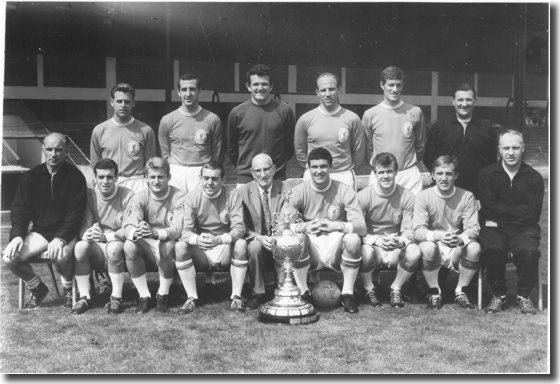 For Don Revie's Leeds United, the acquaintance with the big time kicked
off in earnest on Wednesday, 26 August 1964. Their first game back in
Division One the Saturday before had brought a promising 2-1 win away
to Aston Villa, but the Midlanders were limited opponents. They had been
down among the dead men the previous season, and were still coming to
terms with life after the departure of manager Joe Mercer. Rookie boss
Dick Taylor. Mercer's assistant, had taken charge.
For Don Revie's Leeds United, the acquaintance with the big time kicked
off in earnest on Wednesday, 26 August 1964. Their first game back in
Division One the Saturday before had brought a promising 2-1 win away
to Aston Villa, but the Midlanders were limited opponents. They had been
down among the dead men the previous season, and were still coming to
terms with life after the departure of manager Joe Mercer. Rookie boss
Dick Taylor. Mercer's assistant, had taken charge.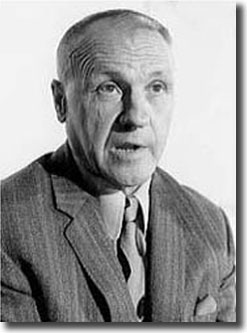 of life and death. I'm disappointed by that approach, I believe it is
much more important than that.;
of life and death. I'm disappointed by that approach, I believe it is
much more important than that.;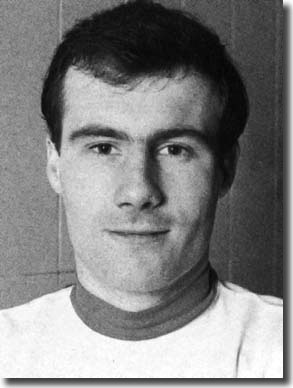 always
on the look out to shoot when half-chance arose.
always
on the look out to shoot when half-chance arose.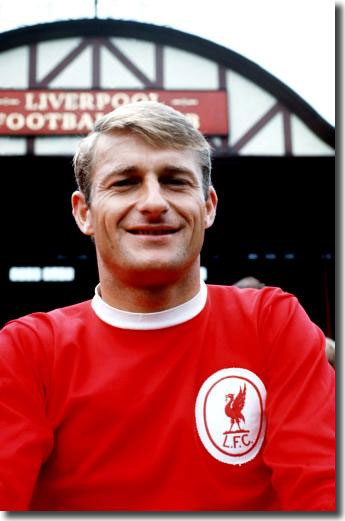 the
scapegoat for many of United's failures, but in this first season in Division
One the attention to detail proved invaluable for Revie's hopes.
the
scapegoat for many of United's failures, but in this first season in Division
One the attention to detail proved invaluable for Revie's hopes.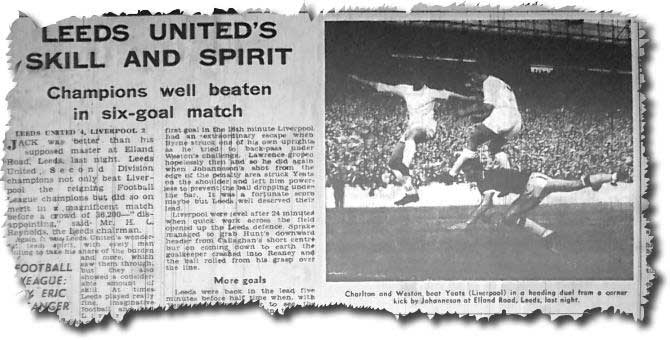 helpless
when Albert Johanneson's shot from the edge of the 18-yard box hit Ron
Yeats on the shoulder and kicked up and under the bar to register a fortunate
opener. The 1-0 advantage was, however, no more than United merited for
their positive approach.
helpless
when Albert Johanneson's shot from the edge of the 18-yard box hit Ron
Yeats on the shoulder and kicked up and under the bar to register a fortunate
opener. The 1-0 advantage was, however, no more than United merited for
their positive approach.